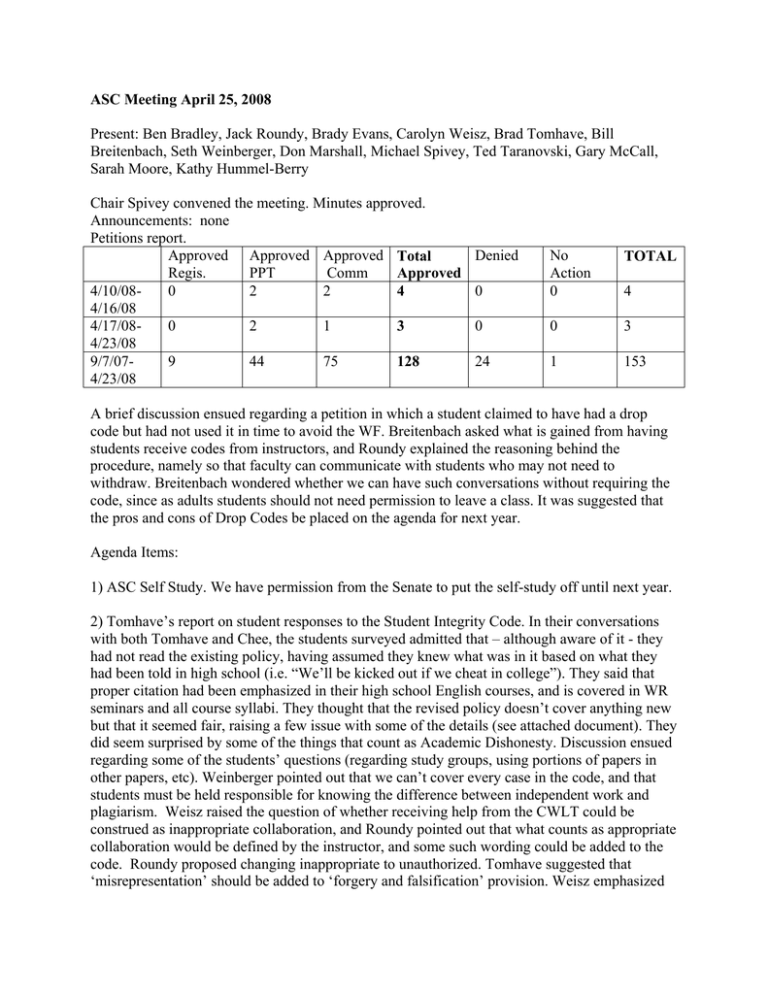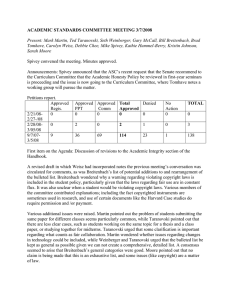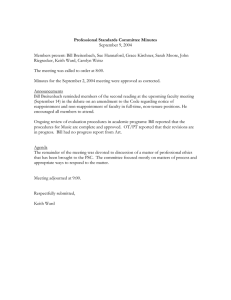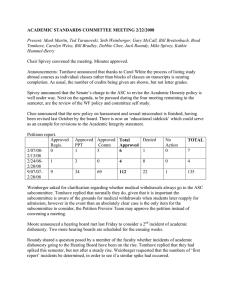ASC Meeting April 25, 2008
advertisement

ASC Meeting April 25, 2008 Present: Ben Bradley, Jack Roundy, Brady Evans, Carolyn Weisz, Brad Tomhave, Bill Breitenbach, Seth Weinberger, Don Marshall, Michael Spivey, Ted Taranovski, Gary McCall, Sarah Moore, Kathy Hummel-Berry Chair Spivey convened the meeting. Minutes approved. Announcements: none Petitions report. Approved Approved Approved Total Regis. PPT Comm Approved 4/10/080 2 2 4 4/16/08 4/17/080 2 1 3 4/23/08 9/7/079 44 75 128 4/23/08 Denied 0 No Action 0 4 0 0 3 24 1 153 TOTAL A brief discussion ensued regarding a petition in which a student claimed to have had a drop code but had not used it in time to avoid the WF. Breitenbach asked what is gained from having students receive codes from instructors, and Roundy explained the reasoning behind the procedure, namely so that faculty can communicate with students who may not need to withdraw. Breitenbach wondered whether we can have such conversations without requiring the code, since as adults students should not need permission to leave a class. It was suggested that the pros and cons of Drop Codes be placed on the agenda for next year. Agenda Items: 1) ASC Self Study. We have permission from the Senate to put the self-study off until next year. 2) Tomhave’s report on student responses to the Student Integrity Code. In their conversations with both Tomhave and Chee, the students surveyed admitted that – although aware of it - they had not read the existing policy, having assumed they knew what was in it based on what they had been told in high school (i.e. “We’ll be kicked out if we cheat in college”). They said that proper citation had been emphasized in their high school English courses, and is covered in WR seminars and all course syllabi. They thought that the revised policy doesn’t cover anything new but that it seemed fair, raising a few issue with some of the details (see attached document). They did seem surprised by some of the things that count as Academic Dishonesty. Discussion ensued regarding some of the students’ questions (regarding study groups, using portions of papers in other papers, etc). Weinberger pointed out that we can’t cover every case in the code, and that students must be held responsible for knowing the difference between independent work and plagiarism. Weisz raised the question of whether receiving help from the CWLT could be construed as inappropriate collaboration, and Roundy pointed out that what counts as appropriate collaboration would be defined by the instructor, and some such wording could be added to the code. Roundy proposed changing inappropriate to unauthorized. Tomhave suggested that ‘misrepresentation’ should be added to ‘forgery and falsification’ provision. Weisz emphasized the usefulness of providing multiple opportunities of exposing students to the document, its content, and spirit. Given the prior motion to accept the revised policy pending student approval, the policy is now approved by the ASC. 2) Regarding Withdrawal Grades. Tomhave reported on his assessment of whether we should abandon the abandonment clause. He pointed out that given the fact nothing else in the Handbook provides a guide for what to do if a student abandons a course, the clause does seem useful. Weinberger wondered what is added by language that says the “instructor may give a WF” (versus, for example, “you will received a WF?” Roundy explained that if a student abandons the course but later it is found that extenuating circumstances existed, this wording permits the instructor to assign a W. Weinberger pointed out that the policy does, then, allow an instructor to give a grade as well, and argued that the policy should be that if you abandon a course you receive a WF. Roundy noted that then abandonment would seem to mandate the WF. Breitenbach suggested that the ambiguity is a result of the fact abandonment is undefined and left to discretion of the instructor, leaving the option for the instructor to assign a grade present. McCall wondered whether defining what counts as abandonment should be left to the instructor. Weinberger pointed out that doing so would allow instructors to give a W, which we are trying to avoid in cases of course abandonment (barring extenuating circumstances, etc). Roundy agreed with Weinberger that the clause does not seem to add anything since the attendance policy seems to cover the problem, but that the attendance policy could be usefully merged with the W- policy section. Hummel-Berry added that for responsible students who have absences for sports or medical issues, strict absence policies raise difficult issues. Evans pointed out that there is a great range of attendance policies on campus. Tomhave emphasized he wants the tools to be available for faculty members to be able to enforce their individual policies. Moore said her only concern with removing the text regarding abandonment is that faculty needing to withdraw a student for abandonment may not realize that the WF is an option. Instead, they may think that a "regular" letter grade is the only alternative. Roundy suggested that we should reference the excessive absence text in the withdrawal policy text. Marshall pointed out that the problem of excessive absences is indeed different from abandonment, since the latter implies a reading of the student’s attitude toward a course, which we don’t necessarily need to be including in policy. Weinberger pointed out that the instructor can decide at what point excessive absences have been reached. Weisz pointed out that the abandonment clause doesn’t seem to be a problem unless it is not clear that the instructor can not give a grade if a W is taking place. Roundy suggested that the attendance policy should be easier to find and attached to the withdrawal policy, and Tomhave agreed. Tomhave will work on some revisions. He will remove the last paragraph and make a reference back to the attendance policy to deal with the abandonment problem. 3) Honor Pledge. Weisz noted that we need to be careful not to ask students to say something that is not true for them personally (i.e. some are not necessarily here voluntarily), and suggested “I have chosen” might work better. Taranovski argued that the question whether we should ask students to affirm certain things / codes / standards is certainly an important one. He pointed out that it is in fact important to ask students to affirm adherence to certain values, and if they do not wish to do so, then they should not attend UPS. Evans suggested that “accept obligations and consequences” sounds too negative and punitive. Breitenbach said they had wished for an explicit acceptance of obligations and consequences, and that the phrase could mean positive obligations and negative consequences. Marshall suggested “rights and responsibilities.” Weinberger suggested that the point of the Honor Code was for students to acknowledge the consequences of their actions. Breitenbach noted that he would prefer to remove the entire line, rather than substitute rights and responsibilities, since he was not sure what ‘rights’ would entail in this context. Taranovski suggested “privileges and responsibilities” (in which consequences is implicit). Marshall suggested leaving out “consequences.” McCall suggested “obligations and privileges.” Weisz suggested “I accept responsibility for my conduct as a student.” Moore was in favor of using “consequences”, despite the fact the tone may indeed be negative during a celebratory occasion, since the point of the Code is to make the existence of consequences clear to students. Weisz suggested that emphasizing consequences is problematic because most students won’t actually face them (i.e. they will not get in trouble), and because while we want them to abide by the principles, they have no choice in accepting any consequence that arises from their actions. Breitenbach pointed out that consequences could also be positive, but Weisz wondered whether students would pick up on such nuance. Evans argued that if the point is to have students sign something that may prompt them to read the policy, the negative tone of ‘consequences’ may not inspire students to read the policy. Taranovski made a motion to accept the proposed Honor Code. The motion was seconded by Hummel-Berry. No vote was taken, and further discussion of the item was postponed to next year. Meeting adjourned. Respectfully submitted, Kristin Johnson


